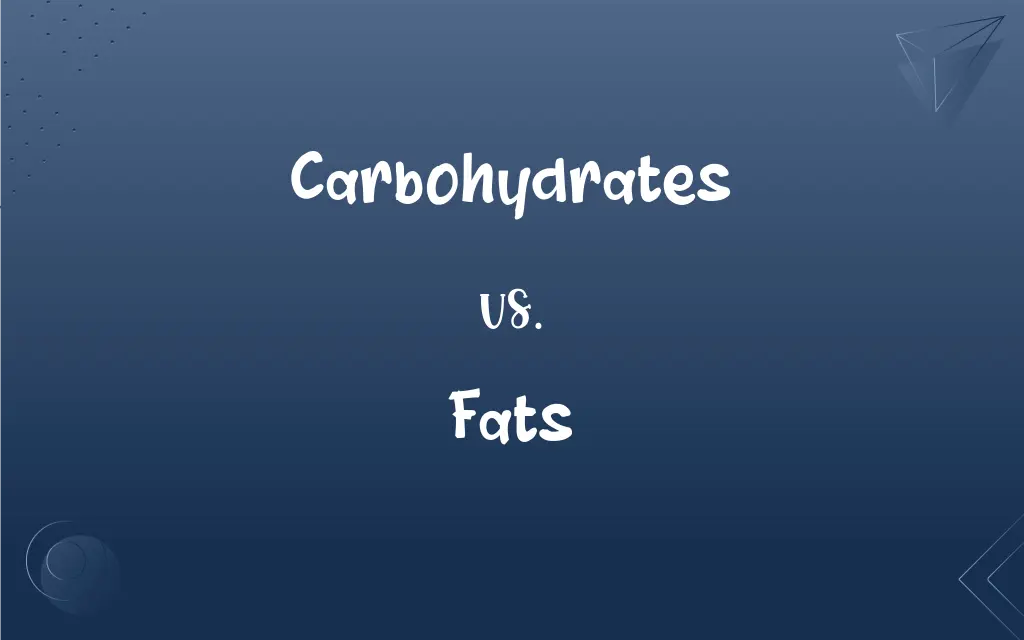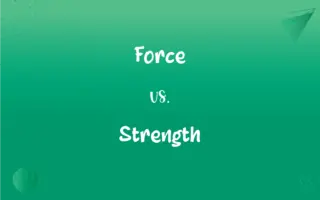Carbohydrates vs. Fats: What's the Difference?
Edited by Aimie Carlson || By Harlon Moss || Updated on October 26, 2023
Carbohydrates are quick energy sources, while fats are dense, long-term energy stores.

Key Differences
Carbohydrates are primary energy sources, broken down into glucose. Fats store energy and provide insulation.
Carbohydrates include sugars, starches, and fibers. Fats encompass saturated, unsaturated, and trans fats.
Carbohydrates are used quickly by the body. Fats are reserved for prolonged energy needs.
In diet, carbohydrates are often associated with grains and fruits. Fats are found in oils, butter, and nuts.
Excess carbohydrates are stored as fat. Excess dietary fats can lead to health issues.
ADVERTISEMENT
Comparison Chart
Primary Function
Quick energy source
Long-term energy storage
Types
Sugars, starches, fibers
Saturated, unsaturated, trans
Usage by Body
Rapidly metabolized
Used for sustained energy
Common Sources
Grains, fruits, vegetables
Oils, nuts, meats
Storage in Body
Converted to glycogen or fat
Stored as adipose tissue
ADVERTISEMENT
Carbohydrates and Fats Definitions
Carbohydrates
Essential for brain function.
Carbohydrates fuel her intense studies.
Fats
Includes saturated and unsaturated types.
Olive oil contains beneficial fats.
Carbohydrates
Organic compounds providing energy.
Rice is rich in carbohydrates.
Fats
Stored for long-term energy.
Her body uses stored fats during marathons.
Carbohydrates
Sugars, starches, and fibers.
Carbohydrates are essential for athletes.
Fats
Important for cell membranes.
Fats are crucial for healthy skin.
Carbohydrates
Found in bread, pasta, fruits.
Her diet is high in carbohydrates.
Fats
Dense energy source and nutrient.
Avocado is a healthy source of fats.
Carbohydrates
Quick source of glucose.
Bananas provide fast-acting carbohydrates.
Fats
Provide insulation and protection.
Fats help maintain body temperature.
Carbohydrates
Any of a group of organic compounds, including sugars, starches, celluloses, and gums, that contain only carbon, hydrogen, and oxygen and that originate chiefly as products of photosynthesis. Carbohydrates serve as a major energy source for living things.
Fats
The ester of glycerol and one, two, or three fatty acids.
Carbohydrates
A food, such as bread, rice, or potatoes, that is composed largely of these substances.
Carbohydrates
Plural of carbohydrate
FAQs
Do carbohydrates cause weight gain?
Excess intake can, but they're important for energy.
Can fats be healthy?
Yes, especially unsaturated fats.
How do fats benefit the body?
They store energy, insulate, and protect organs.
Are carbohydrates found in fruits?
Yes, fruits contain natural sugars and fibers.
Do fats provide more energy than carbohydrates?
Yes, fats have a higher caloric density.
Are carbohydrates essential?
Yes, they're primary energy sources.
Are all fats bad for health?
No, some fats are essential for good health.
Are simple carbohydrates unhealthy?
They can be if consumed in excess.
What's the role of carbohydrates in the body?
They provide quick energy and support bodily functions.
Can fats be part of a healthy diet?
Yes, in moderate and balanced amounts.
Can fats help with vitamin absorption?
Yes, some vitamins are fat-soluble.
Do athletes need carbohydrates?
Yes, for energy during high-intensity activities.
Is it necessary to eat fats every day?
Yes, for essential fatty acids and other benefits.
Should fats be avoided for weight loss?
Not entirely, as they're essential for health.
Are trans fats harmful?
Yes, they can increase the risk of heart disease.
Are carbohydrates quick energy sources?
Yes, they're rapidly converted to glucose.
Do carbohydrates have dietary fibers?
Yes, especially in whole grains and vegetables.
How do fats affect cholesterol levels?
Saturated fats can raise bad cholesterol.
Can low-carb diets be harmful?
They can lack essential nutrients if not balanced.
What happens to excess carbohydrates?
They can be stored as fat in the body.
About Author
Written by
Harlon MossHarlon is a seasoned quality moderator and accomplished content writer for Difference Wiki. An alumnus of the prestigious University of California, he earned his degree in Computer Science. Leveraging his academic background, Harlon brings a meticulous and informed perspective to his work, ensuring content accuracy and excellence.
Edited by
Aimie CarlsonAimie Carlson, holding a master's degree in English literature, is a fervent English language enthusiast. She lends her writing talents to Difference Wiki, a prominent website that specializes in comparisons, offering readers insightful analyses that both captivate and inform.































































